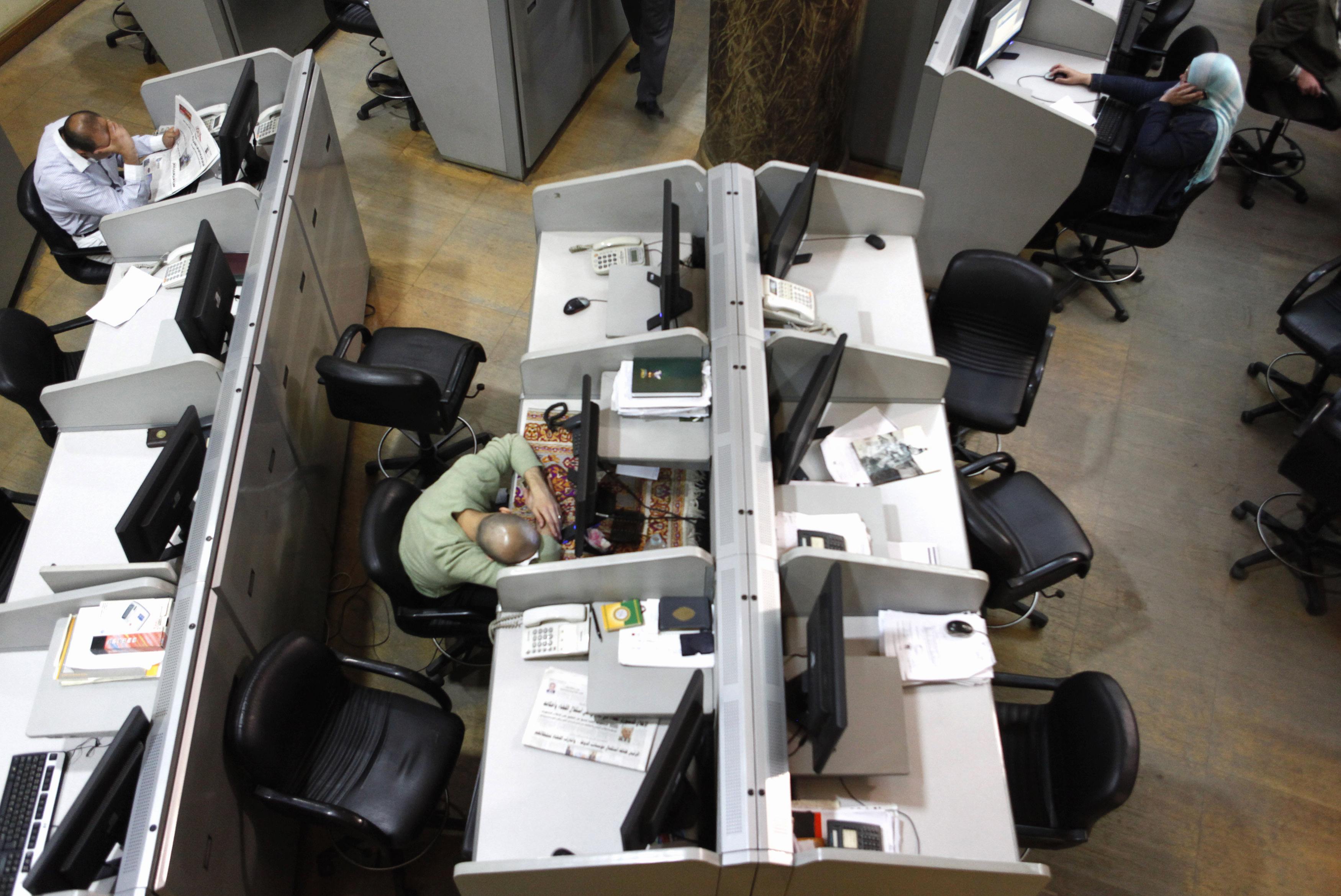Latest NEWS
- Aswat Masriya, the last word
- Roundup of Egypt's press headlines on March 15, 2017
- Roundup of Egypt's press headlines on March 14, 2017
- Former Egyptian President Hosni Mubarak to be released: lawyer
- Roundup of Egypt's press headlines on March 13, 2017
- Egypt's capital set to grow by half a million in 2017
- Egypt's wheat reserves to double with start of harvest -supply min
- Roundup of Egypt's press headlines on March 12, 2017
Saudi stocks tumble as Arab states consider Yemen intervention, Egypt retreats broadly

A man rests at his desk at the Egyptian stock market in Cairo, November 25, 2012. Egyptian share prices plunge, with the benchmark index losing nearly 10 percent in the first trading session since President Mohamed Mursi ignited a political crisis by expanding his powers. REUTERS/Asmaa Waguih
By Olzhas Auyezov
DUBAI, March 25 (Reuters) - Saudi Arabia's stock market tumbled in a broad sell-off on Wednesday as investors grew concerned about upcoming first-quarter earnings announcements, stretched valuations and the escalation of military conflict in neighbouring Yemen.
Other Gulf bourses were also weak, even as oil prices climbed about 1 percent on the back of a weaker U.S. dollar, indicating that concern over Yemen may be shared across the region.
The main Saudi index sank 5.0 percent, its biggest daily drop in three months, with most stocks deeply in the red on strong volume.
The benchmark had vastly outperformed other Gulf markets and was up 12 percent year-to-date as of Tuesday's close. Most other markets in the region are sitting on year-to-date losses.
"We have been talking about expensive valuations for the last couple of weeks," said Abdullah Alawi, assistant general manager and head of research at Aljazira Capital. "But the drop was faster than expected."
Expectations for first-quarter earnings were a negative factor for some stocks, although Alawi said they had mostly been priced in already.
Broker and fund manager Osool and Bakheet Investment Co (OBIC) has published its forecasts for a number of companies, predicting sharp declines for petrochemicals as low oil prices squeeze their profit margins, and minor decreases for some banks.
Advanced Petrochemical Co, whose net profit OBIC expects to plunge 87 percent, tumbled 7.8 percent on Wednesday. National Commercial Bank, the kingdom's biggest lender, fell 5.1 percent after OBIC forecast its quarterly profit would slip 1.5 percent.
Instability in Yemen also hurt market sentiment. Saudi Arabia is moving heavy military equipment including artillery to areas near its border with Yemen, U.S. officials said on Tuesday, indicating a risk that Riyadh might be drawn into the conflict.
The Arab League's deputy secretary general said on Wednesday that the regional body would discuss a proposal by Yemen's foreign minister, who called on Arab states to intervene militarily to halt the Houthi Shi'ite militia's advance.
It is not clear that even military intervention would have a significant impact on the Saudi economy or its domestic security situation, but the news from Yemen nevertheless unsettled some retail investors.
Dubai's index dropped 2.2 percent as Emaar Properties and Arabtec, the most traded stocks, fell 3.3 and 5.0 percent respectively.
Builder Arabtec closed at 2.30 dirhams, again testing major technical support at its July 2014 low of 2.35 dirhams; any clean break of that support - two straight daily closes - would trigger a bearish right triangle pointing considerably lower.
Abu Dhabi's bourse edged down 0.4 percent as National Bank of Abu Dhabi dropped 2.6 percent. But investment firm Waha Capital jumped 3.3 percent after its shareholders approved a 0.30 dirham dividend for 2014.
Chairman Hussain Jasim Al Nowais told the meeting that Waha planned further investments in high growth sectors such as healthcare, education, energy and infrastructure, while its capital markets division was looking to expand into investment management, according to the company's statement.
Qatar fell 1.5 percent with most stocks in the red, while Kuwait edged down 0.5 percent andOman slipped 0.1 percent.
Egypt's market fell 1.8 percent to 9,198 points, a two-month low, in another broad sell-off. Selling pressure intensified after it dipped below technical support at its March low of 9,259 points.
The market rallied earlier this year, first on hopes that cheaper oil would help Egypt bridge its fiscal and foreign trade gaps, and then as the government rolled out plans for new projects worth tens of billions of dollars for an investment summit this month.
But despite oil's plunge, Egypt's current account deficit widened to $2.9 billion in the three months to December from $1.4 billion in the same period the previous year, official data showed at the end of last week.










